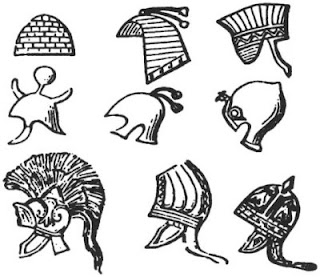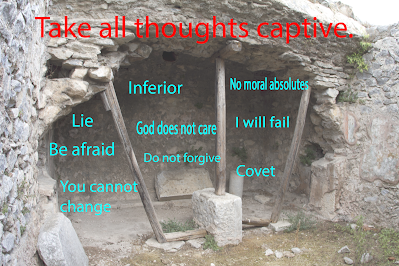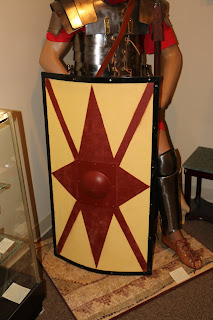Ephesians 6:17, “and take the helmet of salvation, and the
sword of the Spirit, which is the word of God.”
1 Thessalonians 5:8, “But since we belong to the day, let us
be sober, having put on the breastplate of faith and love, and for a helmet the
hope of salvation.”
We are in a battle. If
our body has protection, but our head does not, we are in trouble. Our mind controls where we are going, what we
do, and how our body functions. God has
not left us without protection.
“Since the greatest point of vulnerability for a soldier in
combat was his head, concern for some form of protective helmet can be traced
as far back as the end of the 4th millennium BC. The Sumerians of the early
dynastic period (3100 BC) had already developed a metal helmet … That helmet was slightly pointed and covered
both the ears and the back of the neck. …
“In the Late Bronze Age a collar made of scales was added to
the helmet, closing the gap between the original helmet and the coat of mail.
Armorers continued to experiment with helmet shapes, sometimes for greater
protection for the wearer, at other times for better identification. When
troops were equipped with helmets especially shaped or decorated, field
commanders could identify the position of each unit at any given time.”
We wear the helmet of salvation as we do spiritual
warfare. Salvation comes through
accepting what Jesus did for us in dying to pay for our sins and then being
raised victorious from the dead. It
involves a difference in our standing before God, a victory over the power of
sin, and a future promise of eternal life with God. It affects how we live now and gives us a
hope for the future. God is changing us
day by day. We are becoming a new creation
in Christ.
“Salvation is not just a past-tense event (justification)
with future-tense implications. As we
live underneath its blessing, we enjoy a vibrant, living, daily reality in the
present (sanctification). … Sanctification is a process by which we are
continually delivered from the wrath of God on earth, fortified against the
enemy’s attacks, and molded into the image of Christ as our minds are renewed.”
(Shirer, 2018) Salvation “doesn’t just involve them escaping death but also
entering into a state of health, wholeness, victory, and safety. Our God’s salvation is holistic and involves
the well-being of the whole person- not just rescuing them but even reversing
negative circumstances.” (Shirer, 2018)
We know the events of the world and struggles we face are
not the end of the story. Our focus is
on God. Life is hard. We cannot control what happens in our
world. We are, however, not powerless,
because we have a God who answers prayer and cares about us. That does not mean everything will run
smoothly. It means He will be with us
and may surprise us with how He uses life’s circumstances.
“Today’s ‘momentary light affliction,’ as Paul describes it
in 2 Corinthians 4:17, doesn’t feel light and momentary; such afflictions often
feel like life-shaping, soul-crushing burdens that seem impossible to
bear. But in the light of the certain
hope of our salvation, these burdens are put in a larger perspective. We know that God is up to something good in
our life through afflictions, producing perseverance and character. God tells us, ‘Count it all joy, my brothers,
when you meet trials of various kinds, for you know that the testing of your
faith produces steadfastness’ (James 1:2-3).
Yet if it is just for present benefits that we suffer, trials can be
discouraging. … Hope encourages us by reminding us of the greater realities yet
to come.” (Duguid, 2019)
When we look at the larger picture and promises for
eternity, it changes how we live today.
It changes how we view events.
Our primary focus can be on God and His plans instead of on politics,
health, or world events. We have hope
for both now and the future.
Our minds are under attack.
Satan wants to get our focus off God.
He wants us to be discouraged, condemned, afraid, angry, or distracted. We need to remember God’s salvation offers us
changed lives now and a glorious inheritance for eternity. We will face adversity, pain, and dark
valleys, but we never face these alone.
God is with us. We are a new creation in Him. He forgives us, loves us, and wants us to
have a close relationship with Him.
Pastor Jerry Reifsnyder talks about the helmet of salvation in this video.
Although the promise of eternity gives us a future hope, our
salvation offers us much for the present.
“… It was also supposed to exert
a startlingly clear impact on our present, daily life. But this impact will only be experienced to
the extent that we apply the benefits of salvation to our everyday lives.”
How do we do this? We
must remember who we are in Christ. We are his child who is forgiven and
empowered to live the life He has for us. We have victory through Christ. 2 Cor. 10:5 tells us to “destroy arguments and
every lofty opinion raised against the knowledge of God, and take every thought
captive to obey Christ.” This means we
have to evaluate the thoughts in our minds and things we hear to see if they
are true and in agreement with what we have learned from God’s Word. We are growing in our knowledge of God, and
He convicts us in areas of our life where we are not living right. He tells us in Philippians 4:8 to dwell on
what is true, honorable, pure, lovely, commendable, excellent, or worthy of
praise. That is quite different from
dwelling on what is wrong with us, our neighbors, or our world.
“But however many times we struggle against sin and fail in
this life, our failure is not the last word; the last word is Christ’s
perfection, which clothes us, and the ongoing work of the Holy Spirit within
us.” (Duguid, 2019) He has paid the
price for our sins, past, present, and future.
He will convict us, continue to love us, and work to shape us into what
we should be.
Our minds are where God speaks to us confirming Scripture,
giving direction, convicting us, assuring our hearts, and exposing lies we
believe. “… poisonous thinking will also cripple your
ability to clearly detect the leading of God’s Spirit. As an heir, you’re meant to know and discern
His will, to hear His guiding voice behind you. … The enemy’s lies, when
believed, short-circuit and distort your ability to hear God’s voice clearly
and respond accordingly.” (Shirer, 2018)
“What is more, as a helmet, hope gives you boldness in
faithfully pursuing God’s call on your life.
Sometimes God calls us to do risky things for him; at other times,
faithfulness looks like persisting in doing ordinary things over and over
again, trusting that the Lord will bring fruit we cannot yet see. The hope of salvation encourages us in both
areas.” (Duguid, 2019) We do not measure
our success by results we or others see.
Obedience to God’s leading is what determines our success. He wants us to be willing to leave our
comfort zone and to put Him first in our decisions. He wants us to trust Him even when we don’t
understand His purposes.
“Our attempts may indeed end in failure from a human
perspective, even when we are genuinely pursuing his leading. … Yet even in
that apparent failure, the Lord promises to glorify himself in and through
us. Our labor in Christ cannot and will
not ultimately be in vain, even if the only visible fruit is a single human
life-ours—growing in gratitude to the God who called us and sustains us by his
grace.” (Duguid, 2019) God looks at
things differently than we do. He wants
us to grow in our relationship with Him.
He wants to change us. Becoming
whole in Him is a great success.
Isaiah 51:6, “Lift up your eyes to the heavens,
and look at the earth beneath;
for the heavens vanish like smoke,
the earth will wear out like a garment,
and they who dwell in it will die in like manner;
but my salvation will be forever,
and my righteousness will never be dismayed.’”
Works Cited
Duguid, I. M. (2019). The Whole Armor of God.
Wheaton, IL: Crossway.
Lane, W. (1988). Arms and Warfare. In Baker
Encyclopedia of the Bible (pp. Vol.1, p.183). Grand Rapids, MI: Baker Book
House.
Shirer, P. (2018). The Armor of God. Nashville,
TN: LifeWay Press.
The Holy Bible, English Standard Version. (2016). Crossway Bibles.





























